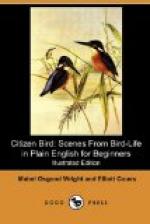“You may go if you eat something first. I wonder if Rap would invite me also?” said the Doctor, leading the way to the big kitchen pantry.
“I know he would!” cried Nat joyfully. “He wished and wished you would go with us, but we didn’t think you’d care to, because you have been to the river woods so many times before. But why must I eat something, uncle? I’m in such a hurry to go.”
“Because, my boy, the life in us is like a fire that must be supplied with fuel to keep it burning, only instead of wood or coal we need food. Very early in the morning this life flame of ours, that is called vitality, is very low, like a fire that has burned down, and if we go out in the damp air and breathe the mists that rise from the ground our vitality has not strength to resist them. But if we put fresh fuel on our inward fire by eating something before we go out, then that bad little mischief-maker, which we call malaria, has harder work to creep into us.”
“How funny! May I call Rap to tell him? Rap! Rap! come in and have milk and something to eat, to make your inside fire burn up chills and fever!”
Rap thought at first that Nat must be crazy, but very soon understood what the Doctor meant, and was overjoyed at the prospect of having him join the expedition.
“Dodo will cry when she wakes up and knows where we have gone,” said Nat, who had been much more kind and thoughtful of his sister since coming to the Farm. But kindness is very catching, and at the Farm everybody was kind, from the House People to the big gray horses in the barn, which let the chickens pick up oats from between their powerful hoofs, without ever frightening them by moving.
“It is too long a walk for little sister, but you must remember everything that you see and hear, and tell her about it. Don’t forget the field-glass,” said the Doctor, following the boys along the road where telegraph wires made bird-perches between the high poles.
“You said a lot of birds came last night,” said Nat to Rap; “but how do you know that they came last night and where did they come from?”
“I know they came last night because they were not here yesterday,” answered Rap; “but I don’t know where they came from, except that it must be from where it is warmer than it is here, because they went away just before it grew cold last fall. See, Doctor, there are some of them now on those fence rails and more up on the telegraph wires. The miller calls them ‘Bee Martins,’ and says that they eat up all the honey-bees. Have they any other name—because I have never seen them catch bees?”
Nat looked at them first with the field-glass, then without it as they drew quite near the fence, and saw a fine bird, twice as long as his middle finger. Its back and wings looked dark gray; it was white underneath, with a touch of gray on the breast, and had a black tail, with white at the end of it. As Nat looked the bird raised a little tuft of feathers on top of its head, as if angry, flew into the air, giving a shrill cry, seized an insect, and returned to its perch.




